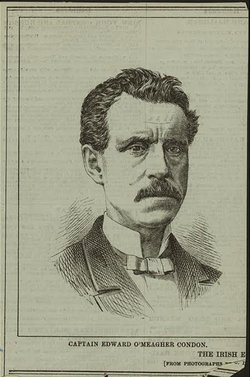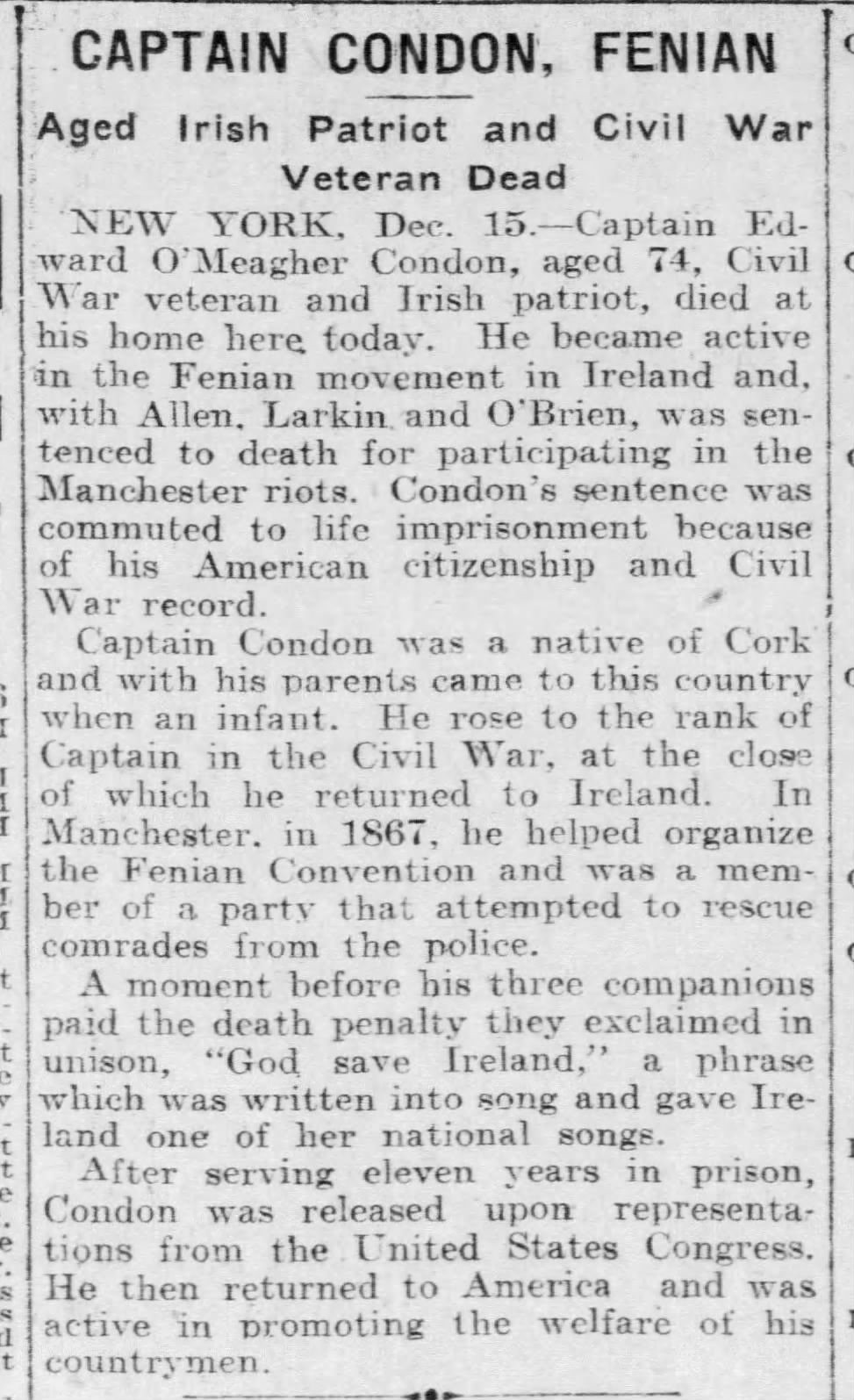A sworn IRB man during the U.S. Civil War, Captain Condon served with distinction in Corcoran's Legion in numerous battles. He was severely wounded at the battle of Cold Harbor. At the close of the U.S. Civil War, Condon was dispatched to Ireland to assist in the work of preparing the country for the manned uprising of 1867.
On September 18, 1867, Condon along with other members of the Fenian movement participated liberating two leaders of the Irish Republican Brotherhood, Captain Thomas J. Kelly and Captain Timothy Deasy, who were being transferred in a prison van in Manchester, England. In the course of freeing Captains Kelly and Deasy, an unarmed police officer named Charles Brett was shot dead. Condon was captured, tried and sentenced to death along with three other Fenians, William Allen, Michael O'Brien and Michael Larkin.
Prior to his sentencing, Condon addressed the Court in a famous speech in which he said "You will soon send us before God, and I am perfectly prepared to go. I have nothing to regret, or to retract, or take back. I shall only say, GOD SAVE IRELAND."
Those words spread and became the basis of the first Irish National Anthem. As a result of the last-minute intervention of the U.S. Ambassador, O'Meagher Condon's sentence was commuted to a prison term. He served eleven years of hard labor and was ultimately released from Portland Convict Prison by request of a Joint Resolution of the U.S. Congress asking President Hayes to secure his fair trial.
Allen, O'Brien and Larkin, who became known as the Manchester Martrys, were hanged for their part on the raid on November 23, 1867.
Large public demonstrations were held for Condon in New York, Philadelphia, and Boston upon his return to America in 1878. He was sworn into Clan na Gael and soon became its leader in Washington, DC, where he secured employment in with the U.S. Treasury Department.
Condon was active in Clan na Gael and supported armed insurrection until the death of his friend Mackey Lomasney in London. He introduced Charles Stewart Parnell to the American Congress.
Condon authored a book The Irish Race in America which was published in 1887.
Condon died on December 15, 1915; his funeral was held at the Church of St. Jean Baptiste (Lexington Ave. at 76th Street, Manhattan), after which he was interred in Calvary Cemetery.
A sworn IRB man during the U.S. Civil War, Captain Condon served with distinction in Corcoran's Legion in numerous battles. He was severely wounded at the battle of Cold Harbor. At the close of the U.S. Civil War, Condon was dispatched to Ireland to assist in the work of preparing the country for the manned uprising of 1867.
On September 18, 1867, Condon along with other members of the Fenian movement participated liberating two leaders of the Irish Republican Brotherhood, Captain Thomas J. Kelly and Captain Timothy Deasy, who were being transferred in a prison van in Manchester, England. In the course of freeing Captains Kelly and Deasy, an unarmed police officer named Charles Brett was shot dead. Condon was captured, tried and sentenced to death along with three other Fenians, William Allen, Michael O'Brien and Michael Larkin.
Prior to his sentencing, Condon addressed the Court in a famous speech in which he said "You will soon send us before God, and I am perfectly prepared to go. I have nothing to regret, or to retract, or take back. I shall only say, GOD SAVE IRELAND."
Those words spread and became the basis of the first Irish National Anthem. As a result of the last-minute intervention of the U.S. Ambassador, O'Meagher Condon's sentence was commuted to a prison term. He served eleven years of hard labor and was ultimately released from Portland Convict Prison by request of a Joint Resolution of the U.S. Congress asking President Hayes to secure his fair trial.
Allen, O'Brien and Larkin, who became known as the Manchester Martrys, were hanged for their part on the raid on November 23, 1867.
Large public demonstrations were held for Condon in New York, Philadelphia, and Boston upon his return to America in 1878. He was sworn into Clan na Gael and soon became its leader in Washington, DC, where he secured employment in with the U.S. Treasury Department.
Condon was active in Clan na Gael and supported armed insurrection until the death of his friend Mackey Lomasney in London. He introduced Charles Stewart Parnell to the American Congress.
Condon authored a book The Irish Race in America which was published in 1887.
Condon died on December 15, 1915; his funeral was held at the Church of St. Jean Baptiste (Lexington Ave. at 76th Street, Manhattan), after which he was interred in Calvary Cemetery.
Sponsored by Ancestry
Advertisement
Advertisement





